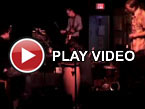Earth, "Angels of Darkness, Demons of Light II"
 For a band known for playing so damned slow, Earth have evolved quickly the past few years. Their visionary work takes yet another step into uncharted waters on this new release. Billed as a continuation of last year's album of the same name, Earth's music takes a turn toward sparse improvisation, with a suite of five songs openly influenced by English folk-rock and blues.
For a band known for playing so damned slow, Earth have evolved quickly the past few years. Their visionary work takes yet another step into uncharted waters on this new release. Billed as a continuation of last year's album of the same name, Earth's music takes a turn toward sparse improvisation, with a suite of five songs openly influenced by English folk-rock and blues.
Angels of Darkness, Demons of Light II was cut from the same sessions as its elder sibling, but doesn't share the same blueprint. Gone are fully composed, structured songs like "Old Black" and "Father Midnight," which opened the first album with plodding, desolate blues shot through with cello and low-end guitar/bass drone. Those two songs circled like vultures around their skeletal, stripped-down melodies for ten minutes at a clip, never veering beyond the guardrails imposed by the band's patient rhythm section. All told, those songs weren't a far cry from those on The Bees Made Honey in the Lion's Skull; new instrumentation aside, Angels I sounded like a refinement of that album's luscious, drone-heavy Americana.
On Angels II, however, the closest reference point is the fully improvised title track of Angels I, on which Lori Goldston and Dylan Carlson's tonal and melodic interplay meandered for 20 minutes, the rhythm section keeping (very slow) time at arm's length. In contrast to its neatly composed neighbors on Angels I, the title track seemed at odds with the rest of the album; now, it makes perfect sense alongside Angels II, which brings the band's improvisational skills into the limelight. Everything on Angels II was reportedly improvised in the studio, bringing an incredibly loose, relaxed, and laid-back feel to the album. It is also very clearly a team effort, with no single player stealing the spotlight or outshining the rest; these are balanced, full-band compositions through and through.
What surprises and pleases me most about Angels II—and has kept the album on repeat in my home for over a month now—is the spaciousness of the music. For a band that cut its teeth pioneering the feedback-laden world of doom metal, there is nary a trace of that genre's density of sound. Instead, the album's first track, "Sigil of Brass," kicks off with a subtle drone and Carlson's clean guitar playing a bare-bones melody, its notes borderline assertive enough to pierce the surrounding air. "His Teeth Did Brightly Shine" is all slow-motion guitar and bass interplay, with Adrienne Davies adding a feather's touch on cymbals to remind of her existence. Toward the end, a hint of dissonance enters as Carlson gently bends his guitar strings out of tune—a subtle touch that breathes new interest into the song.
Goldston finally makes her presence known on "Waltz (A Multiplicity of Doors)," her cello screeching and sawing away while the band ambles onward in 3/4 time—a waltz as imagined by drone connoisseurs. Midway through the track, the cello gets more aggressive, increasing in volume and tonal intensity, if not tempo, building the album's tension to a peak, then letting off again. It's a patiently composed piece that proves the old adage about the journey being more important than the destination. "The Corascene Dog" spotlights Carlson's guitar more so than anything else on the album, cycling through minimal chord progressions with ever so subtle changes in tone and phrasing, his playing clean and confident.
More than ever, Earth sound eager to push forward into new territory, content to let the growing legions of drone and doom metal acolytes—Sunn O))), Nadja, Barn Owl, Corrupted, Grails—carry Carlson's ancient torch. This bold mindset is best exemplified by the closing track on Angels II, "The Rakehell," its bluesy grandeur a sharp distillation of Earth's talents. The rhythm section has a newfound, gentle sway in its playing; instead of just hulking along patiently for 12 minutes, it actually swings—like a jazz band on slow-motion playback. Over this foundation, Carlson's guitar and Goldston's cello wind through a lovely, blues-based melody that seems all too familiar and nostalgic. This is gorgeous stuff, relaxed and spacious, full of life.
Samples:



